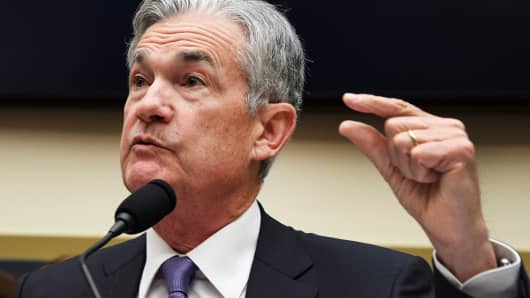- Asked about the Fed's thoughts on the cannabis space, Chair Jerome Powell says further regulatory guidance would be helpful.
- "I think it would be great to have clarity," Powell says. "It puts financial institutions in a very difficult place and puts the supervisors in a difficult place, too."
- Marijuana remains illegal on a federal level in the United States, but 10 states and the District of Columbia have allowed its use for recreational purposes.
Thomas Franck
Federal Reserve Chairman Jerome Powell
said before the U.S. Senate Tuesday that conflicting federal and state
laws on the sale of marijuana and other cannabis products put bank
supervisors in a "very difficult place."
Asked by Sen. Robert Menendez, D-N.J., about the Fed's thoughts on the cannabis space, the leader of the U.S. central bank said further regulatory guidance would be helpful for bank overseers.
"I think it would be great to have clarity," Powell said from Capitol Hill. "It puts financial institutions in a very difficult place and puts the supervisors in a difficult place, too. It would be nice to have clarity on that supervisory relationship."
Cannabis has proven a puzzling topic for both Washington and Wall Street, which is discovering a unique set of hurdles as it explores the burgeoning marijuana and hemp markets, ranging from lending restrictions to disagreeing local laws. Marijuana remains illegal on a federal level in the United States, but 10 states and the District of Columbia have allowed its use for recreational purposes. Michigan became one of the latest to OK marijuana in November.
New Jersey legislators are also considering the legalization of recreational marijuana.
That's put marijuana retailers and banks within those jurisdictions in a tough position. To accept deposits or loan to cannabis businesses could put a financial institution at odds with the Department of Justice and the Food and Drug Administration, which prohibits companies from adding active ingredients that are drug products in foods and drinks.
Some of that uncertainty was cleared up late last year, when the recent U.S. farm bill removed hemp from the federal government's list of controlled substances and opened up nascent markets in CBD, cannabidiol. Hemp, a plant related to marijuana minus the psychoactive drug THC, is said to ease a wide range of medical ailments, including epilepsy and arthritis.
Questions remain, however, for those who want to sell or bank money from the marijuana business.
A flurry of federal regulations currently deter banks from working with legal dispensaries in the U.S. and mandate that banks and other financial firms file "suspicious activity reports" to help monitor money laundering. Others have brought the just-say-no attitude to Wall Street, steering clear of any services related to the marijuana business for fear of federal prosecution.
Asked by Sen. Robert Menendez, D-N.J., about the Fed's thoughts on the cannabis space, the leader of the U.S. central bank said further regulatory guidance would be helpful for bank overseers.
"I think it would be great to have clarity," Powell said from Capitol Hill. "It puts financial institutions in a very difficult place and puts the supervisors in a difficult place, too. It would be nice to have clarity on that supervisory relationship."
Cannabis has proven a puzzling topic for both Washington and Wall Street, which is discovering a unique set of hurdles as it explores the burgeoning marijuana and hemp markets, ranging from lending restrictions to disagreeing local laws. Marijuana remains illegal on a federal level in the United States, but 10 states and the District of Columbia have allowed its use for recreational purposes. Michigan became one of the latest to OK marijuana in November.
New Jersey legislators are also considering the legalization of recreational marijuana.
That's put marijuana retailers and banks within those jurisdictions in a tough position. To accept deposits or loan to cannabis businesses could put a financial institution at odds with the Department of Justice and the Food and Drug Administration, which prohibits companies from adding active ingredients that are drug products in foods and drinks.
Some of that uncertainty was cleared up late last year, when the recent U.S. farm bill removed hemp from the federal government's list of controlled substances and opened up nascent markets in CBD, cannabidiol. Hemp, a plant related to marijuana minus the psychoactive drug THC, is said to ease a wide range of medical ailments, including epilepsy and arthritis.
Questions remain, however, for those who want to sell or bank money from the marijuana business.
A flurry of federal regulations currently deter banks from working with legal dispensaries in the U.S. and mandate that banks and other financial firms file "suspicious activity reports" to help monitor money laundering. Others have brought the just-say-no attitude to Wall Street, steering clear of any services related to the marijuana business for fear of federal prosecution.


No comments:
Post a Comment